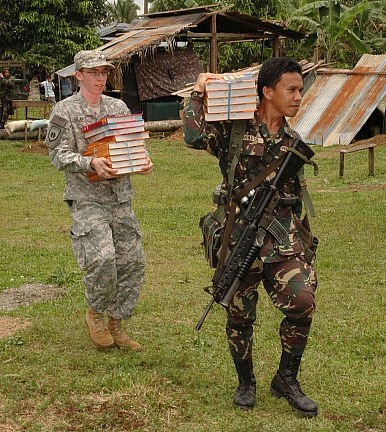The Islamic militant group Abu Sayyaf may be spreading its unwanted tentacles.

An American and Filipino soldier near a rebuilt school in Basilan in 2009 that was burnt down by the Abu Sayyaf. (Image Credit: Flickr/US Pacific Command)
As the rest of the world grapples with the Islamic State of Iraq and Syria (ISIS), their latest attacks on
That message was clear following a leaked memo from within the Malaysian police published by
the news portal Malaysiakini detailing how the Abu Sayyaf has
established cell networks in East and West Malaysia, which were prepared to carry
out terrorist-styled attacks.
Local police in Kota Kinabalu – where tourist dollars hold
pride of place on the local political agenda – denied the reports circulating on social media that eight
suicide bombers had been planted in the state of Sabah and another 10 in Kuala Lumpur
But these threats can’t be discounted given the vacuum left
by the bloody demise of Jemaah Islamiyah (JI) and its even nastier
offshoot Jemaah Ansharut Tauhid (JAT) across the region. Both groups once
shared with the Abu Sayyaf in the Philippines
This is unusual as the Abu Sayyaf – who have been widely,
and justifiably, vilified as thugs – have largely kept their operations in
Basilan, Jolo and surrounding islands, spilling into the Sulu Sea and
only sometimes into nearby Sabah, since the group’s inception in 1991.
Operational cells in Kuala Lumpur
Those operations include kidnap and extortion — a major
income stream. Group leaders espouse Islamic virtues and have sworn allegiance
to ISIS but the few who have had the chance to
view them up close and personal tell a different story.
Among them is the Australian Warren Rodwell, who was
kidnapped by the Abu Sayyaf and held for more than 15 months. He told The
Diplomat that kidnapping and extortion were “just scratches” on the surface
of their operations.
He said the group was heavily involved in human trafficking,
“none of which is regarded as criminally or perhaps morally wrong to the lowly
educated members of this second/third generation cottage industry.”
Rodwell said Abu Sayyaf militants prayed when bored and
rarely was jihad ever mentioned.
“I did not hear anything about jihad until the last month
(of captivity) when a couple of seasoned jungle fighters were guarding me,” he
said. “For the most part, I would regard them as a bunch of thugs.”
The East Malaysian state has been subject to unwanted travel
warnings from Western embassies and the Sabah
state government also has a long and menacing history of leaning on journalists
who do not toe the official business-friendly story.
Nevertheless it was JI – as al-Qaeda’s regional proxy – that
wrote the latter day prescription for a Southeast Asian caliphate, detonating
bombs across Indonesia with
much of the planning and proselytizing done from Malaysia
and hideouts in Thailand and
Cambodia as well as the Philippines
If the Abu Sayyaf is spreading its wings as an ISIS proxy
into Malaysia, a Muslim country with secular pretensions, then fears that the
militant insurgency — which dominated the region’s political landscape in the
first decade of this century — is making a resurgence will be realized.
Just last week Malaysia ’s
defense minister, Hishammuddin Hussein, said he and other Malaysian leaders were on an ISIS hit list.
The Abu Sayyaf is every bit the Daesh — an
Arab word meaning ‘a group of bigots who impose their will on others.’ The word
is currently striking a chord in the English lexicon following the Paris
As a paramilitary group, the Abu Sayyaf has sworn allegiance
to ISIS chief Abu Bakr al-Baghdadi, has
outlasted its contemporaries, is well armed, and can make bombs. And that is
exactly what ISIS needs if it is to pick-up from where JI and JAT left off in
the push for a Southeast Asian caliphate, not unlike the one it seeks in the Middle East .

Lots of questions raised concerning the credibility of reports concerning ASG cells/projected terrorist activities in Malaysia. The reports seem a bit over the top.
ReplyDelete